Person of the Year 1862?
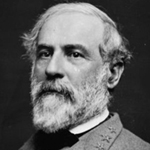 Like many of you I too spent my Saturday afternoon watching the live 6-hour broadcast of the Museum of the Confederacy’s Person of the Year: 1862 symposium on CSPAN-3 (Watch here). With a spring calendar that includes a documentary film shoot, multiple speaking engagements and a new book release, the last thing I want to do on a weekend is watch a bunch of Civil War historians wax the poetic about dead guys.
Like many of you I too spent my Saturday afternoon watching the live 6-hour broadcast of the Museum of the Confederacy’s Person of the Year: 1862 symposium on CSPAN-3 (Watch here). With a spring calendar that includes a documentary film shoot, multiple speaking engagements and a new book release, the last thing I want to do on a weekend is watch a bunch of Civil War historians wax the poetic about dead guys. I couldn’t pass this one up as it boasted a line-up that included Robert K. Krick, David Blight, James McPherson, Jack Mountcastle, and Emory Thomas. Unfortunately, as much as I respect these guys and enjoyed their talks, I couldn’t help but notice the drastically apparent ‘one-dimensionality’ of the entire event. What you had at the end of the day was a bunch of old white people, sitting in an auditorium together, listening to a bunch of old white people. It was an uber-cliché…a Civil War seminar, held in Richmond Virginia, with no racial or age diversity in attendance. I wonder if anyone other than a Confederate could win.
In addition, it seemed a bit too ironic that CSPAN filled in the 40-minute ‘lunchtime’ period of the broadcast by replaying the ground breaking ceremony for the Smithsonian’s new National Museum of African American History and Culture. I wonder if that was a conscious decision. The only other moment of diversity was David Blight’s portion in which he nominated Frederick Douglass for his Person of the Year. The other nominees were Krick’s nomination of Stonewall Jackson, McPherson’s surprise pitch for David Farragut, Gen. Mountcastle’s selection of George McClellan and Emory’s predictable choice of Robert E. Lee. All five speakers did admirable jobs presenting their arguments (although I thought the winner actually had the weakest).
At the conclusion of the day’s lectures, a poll was held among the audience who elected Lee in a landslide as their Person of the Year: 1862. Surprised? Nope. BTW: Lincoln won the title the previous year ‘1861’.
In between the lectures each historian took phone calls from TV viewers. In a perfect demonstration of everything that is wrong with debating Civil War memory one African-American caller compared Robert E. Lee to the Nazi war criminal Joseph Mengele and argued that he should be dug up, burned, and have his ashes scattered. A Good Ol' Boy immediately dialed in and spent his 2-minutes defending Confederate history. One caller questioned Lincoln’s sexuality while another brought modern politics into the conversation while taking a jab at the Republican Party. Emory, who was hilariously witty lost a ton of points with me when he glossed over the issue of Lee’s racism and actually referred to him as an emancipator.
That said, the fact that I was able to simultaneously watch a Civil War Sesquicentennial symposium and the ground breaking ceremony for an African-American history museum reminded me how great it is to be a historian in 2012, witnessing all of the growth in the nation’s efforts for historical preservation and presentation. I seem to constantly forget that.
Kevin Levin over at Civil War Memory was the first in the blogosphere to post about the MOC event and I could not agree with him more. He recommends that the committee assemble “a panel of younger historians, whose choices may not be so predictable.” He adds that “You have to include at least one woman and an African American. In short, perspective is everything when it comes to these kinds of events.”
It would be nice to see more diverse participants and attendees. It’s definitely time for that. The fact that Robert E. Lee won was a total disappointment for me. Looking at the audience I couldn’t help but feel that they would pick him no matter who was on the ballot. I would even predict that if you nominated Lee next year under the same circumstances he would win again.
This is not a slight at Lee, nor toward the people who participated in the event, but rather a criticism of the lack of diversity represented there. I would like to see them market these events towards a broader demographic and change the election's focus to be “The most unpredictable person of the year.” That would stir things up.
At the end of his post Kevin asked who would you nominate and named Benjamin Butler as his pick. I’m going way out of the box and selecting Ambrose Powell Hill. What!? Yes, here is my quick and dirty 6th-degrees of Kevin Bacon argument: A.P. Hill ordered one of the most amazing quick-step marches from Harpers Ferry to Sharpsburg, arriving in the ’11th hour’ of the Battle of Antietam, ultimately saving Lee’s Army of Northern Virginia from destruction and forcing a tactical ‘stalemate’.’ The repercussions of the outcome of the Battle of Antietam ultimately influenced President Abraham Lincoln to finally issue the Emancipation Proclamation. A.P. Hill’s actions at Sharpsburg therefore affected BOTH sides of the conflict tremendously and turned the entire focus of the war in 1862.
Yeah I know it’s a stretch, but definitely an unpredictable nominee. Let's hope that we see some surprises next year when they elect their Person of the Year: 1863.
Update: Pines Bridge project
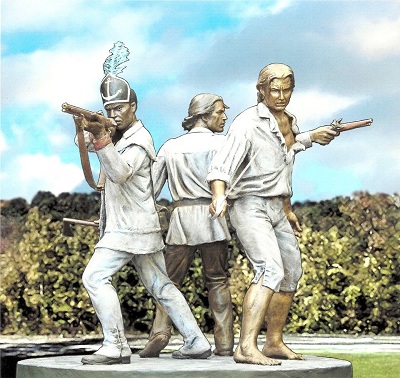
Our friend Michael Kahn just sent me an update on the Pines Bridge Monument Project:
The Pines Bridge Monument Committee, in conjunction with the Yorktown Chamber of Commerce, the Yorktown Historical Society, and the Yorktown Planning Department is pleased to announce the selection of a sculptor and design for the Battle of Pines Bridge Monument. On May 14, 1781, just after sunrise there was a surprise attack on the first Rhode Island Regiment headquartered at the Davenport House in Croton Heights. This regiment was comprised of African American, Native American and European American soldiers under the command of Colonel Christopher Greene.
After months deliberating and considering the diverse designs, we have entered into negotiations with renowned sculptor Jay Warren from Rogue River, Oregon. Mr. Warren's previous commissions include both portions of the New Jersey World War II Memorial, the New Jersey Korean War Memorial, Victims of Terrorism Memorial at the Raritan Bay Waterfront Park overlooking the World Trade Center Site; John Coltrane Monument in High Point, NC, and the Sojourner Truth Memorial in Northampton, MA among many others (www.warrensculpture.com).
As you can see by the artist's sketch, the anticipated sculpture is extraordinary. You can now purchase bricks in support of the project here. Congrats to Michael and his committee for proving that commemorating our collective history matters.
Vampires suck. Zombies don't.
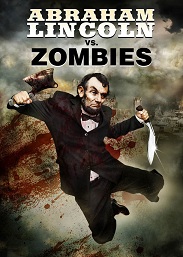 I’m sure many of you have heard about the upcoming film titled “Abraham Lincoln: Vampire Hunter.” As both a historian and a film producer I cannot believe something this absurd found its way to the big screen. I suspect that it won’t break any box office records once it’s released. The mere concept of our 16th president hunting down vampires is absolutely ridiculous and with the continued ‘sissyfication’ of these bloodsuckers (courtesy of the Twilight Series) I don’t anticipate much of a scare.
I’m sure many of you have heard about the upcoming film titled “Abraham Lincoln: Vampire Hunter.” As both a historian and a film producer I cannot believe something this absurd found its way to the big screen. I suspect that it won’t break any box office records once it’s released. The mere concept of our 16th president hunting down vampires is absolutely ridiculous and with the continued ‘sissyfication’ of these bloodsuckers (courtesy of the Twilight Series) I don’t anticipate much of a scare.
On the other hand, there is another film, VERY similar in scope, but much more believable. It is titled “Abraham Lincoln vs. Zombies” and already looks to be a winner. This historically-hysterical film stars our friend Bill Oberst Jr. (Sherman’s March) as the undead-slaying emancipator and is set for a May 22 release. According to the film’s promo:
While the Civil War rages on, President Abraham Lincoln must undertake an even more daunting task: Destroying the Confederate Undead. Oberst, known to over 60 million Facebook users as the cyber-stalker in Jason Zada’s viral Facebook application Take This Lollipop, says it is one of the best roles he’s ever had, and he’s playing it straight. The actors says, “Richard Schenkman’s script is an incredibly fun mix of alternate history and horror. This is very much the Lincoln of history...except that he battles the walking dead with a bloody farm implement.” Many of the film’s lead zombies are being played by self-professed ‘zombie geeks;’ actors who specialize in portraying the undead, like Perry Foster (The Walking Dead). The production is operating under a “curse” placed on it by an anonymous Savannah resident who wrote in an e-mail to The Asylum: “I place the Curse Of Savannah upon your head and may it follow you the rest of your life if you make this film here. You have been warned.” Savannah locations have included the historic Fort Pulaski, where Confederate troops battled a Union onslaught in 1862, leaving nearly 400 dead.”
So once again, this movie is about Abraham Lincoln killing zombies. N-O-T vampires. Plausible? Well... (I bet its more historically accurate than a David Barton lecture.) Awesome? Absolutely! Maybe I'll get Bill to provide us with some exclusive insights on this fun project. Afterall, he is the creepiest and hardest working guy in showbusiness. He's also one of the nicest guys you'll ever meet.
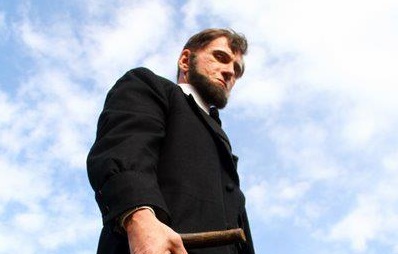
Abraham Lincoln vs. Zombies (2012) Movie Image
Op-Ed: Question everything - especially them
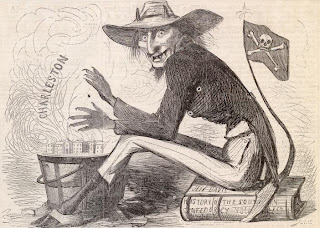 As a recovering Confederate-apologist, I have become quite sensitive to the propagation of Lost Cause mythology that is so pervasive among southern heritage bloggers today. Since my conversion I have come to realize that there is such a vast difference between writing Confederate history and worshipping it. I am most irritated over the Confederate-apologist’s constant use of the term “revisionist” when referring to anyone who disagrees with their version of the Civil War.
As a recovering Confederate-apologist, I have become quite sensitive to the propagation of Lost Cause mythology that is so pervasive among southern heritage bloggers today. Since my conversion I have come to realize that there is such a vast difference between writing Confederate history and worshipping it. I am most irritated over the Confederate-apologist’s constant use of the term “revisionist” when referring to anyone who disagrees with their version of the Civil War.
The implication of that statement is that the act of revision is a bad thing. This could not be further from the truth. Revision is actually good. Revision means to expand on - or correct. According to the textbook definition:
Historical revisionism is the critical re-examination of presumed historical facts and existing historiography, it is the reinterpretation of orthodox views on evidence, motivations, and decision-making processes surrounding a historical event. The constant revision of history is part of the normal scholarly process of writing history.
How can that possibly be looked upon as a negative? After all, what IS the study of history, but the search for deeper meaning? The fact of the matter is that these southern heritage folks have zero interest in deeper meaning. They are completely satisfied with their own versions of historical memory and have absolutely no desire to evolve in these perceptions. They also appear to live in constant fear of learning anything new. As if that is also a bad thing. I was once told by a southern writer that perhaps there isn’t anything new to add to the discussion. His exact words were: “Maybe there's nothing new to tell. I don’t seek the new - just the facts. New and faddish are related.” What?
You may have noticed that I don't really plug my first three books on this blog anymore. Why? Because I once felt the exact same way as these folks and it definitely skewed my historical interpretations. Thankfully I realized my bias and worked very hard on my last three books to correct that. Now I find myself debating the very same folks that I once considered kindred spirits. Fortunately my academic friends have been trying very hard to convince me that you cannot reason with these folks. They are fanatically set in their ways and they will not waiver. Don't try and debate them they say. Instead, question them…
Considering the overwhelming historical record, it's appropriate to ask: Why is it so difficult for so many Confederate apologists to admit that the ONE state's right that mattered above all else - according to the secessionists themselves - was the 'right' to own slaves? That the one type of 'property' that they were concerned with, above all else, was the nearly 4 million slaves that they owned? Worth several billion dollars in 1860 money - which translates into the equivalent of how many tens of billions, today?
I believe that many people are in fact sincere when they say things like 'heritage, not hate' and 'it wasn't really about slavery.' But the only reason they can say these things sincerely, I believe, is because they are genuinely ignorant of what the secessionists themselves wrote and said to justify their cause. We are simply not taught these things in history classes in school, not shown the original speeches and documents that make so clear what it was about. But with the 150th anniversary of the Civil War fast upon us, the historical revisionism will be coming fast and furious. So we had best be prepared to confront the apologists with the words and documents of the secessionists.
Ask them to explain the Confederate Constitution’s provisions on slavery. Ask them to explain the various declarations of the causes of secession put out by the states. Ask them to explain what the secession commissioners wrote and said, as official representatives of their states. And see if, once they are informed and educated, they can still bring themselves to romanticize the Lost Cause. - What Caused the Civil War: or, How to argue with a Confederate apologist
I embrace this newfound perspective not in an attempt to disrespect Confederate history or those who have an attachment to it...I simply believe that we do a great disservice when we alter historical memory in support of a preconceived notion or agenda. Unfortunately, this has become the norm among many so called "Pro-Confederate" heritage groups. Far too many folks are flat out ignoring or disregarding the issue of slavery, or propagating myths such as the Black Confederates.
In their efforts to legitimate their perspective, they are actually creating a false memory of their forefathers. This renders their credibility useless and nullifies their counter-argument capabilities.
Coming up...
Clip shot by an attendee at one of my related lectures at the Manassas Museum
In keeping with this month’s theme I am working on a post about segregation via separate (side) entrances in our area’s most historic churches. This includes Massaponnax Baptist Church, Old Salem Church and Zion United Methodist Church. I have always been fascinated with the hypocrisy of the early ‘integrated congregations’ that worshipped ‘together’ prior to the Civil War and how racism was often masked as paternalism. The fact that these three churches’ actual architecture was designed in such a way to maintain the social order of the period is quite telling.
In my studies over the years into the role of religion during the Civil War, I have found that many of my fellow Christians were among the most prejudice. I am hoping to include some recollections from both white and black members of the congregation (whenever possible) along with excerpts from my book Historical Churches of Fredericksburg and my lecture titled Houses of the Holy: A study in pre-war race relations at Fredericksburg's landmark churches. Stay tuned…
Posted by ny5/pinstripepress
at 10:32 AM EST
Updated: Wednesday, 15 February 2012 2:11 PM EST
Permalink |
Share This Post
 Like many of you I too spent my Saturday afternoon watching the live 6-hour broadcast of the Museum of the Confederacy’s Person of the Year: 1862 symposium on CSPAN-3 (Watch here). With a spring calendar that includes a documentary film shoot, multiple speaking engagements and a new book release, the last thing I want to do on a weekend is watch a bunch of Civil War historians wax the poetic about dead guys.
Like many of you I too spent my Saturday afternoon watching the live 6-hour broadcast of the Museum of the Confederacy’s Person of the Year: 1862 symposium on CSPAN-3 (Watch here). With a spring calendar that includes a documentary film shoot, multiple speaking engagements and a new book release, the last thing I want to do on a weekend is watch a bunch of Civil War historians wax the poetic about dead guys. 






 I’m sure many of you have heard about the upcoming film titled “Abraham Lincoln: Vampire Hunter.” As both a historian and a film producer I cannot believe something this absurd found its way to the big screen. I suspect that it won’t break any box office records once it’s released. The mere concept of our 16th president hunting down vampires is absolutely ridiculous and with the continued ‘sissyfication’ of these bloodsuckers (courtesy of the Twilight Series) I don’t anticipate much of a scare.
I’m sure many of you have heard about the upcoming film titled “Abraham Lincoln: Vampire Hunter.” As both a historian and a film producer I cannot believe something this absurd found its way to the big screen. I suspect that it won’t break any box office records once it’s released. The mere concept of our 16th president hunting down vampires is absolutely ridiculous and with the continued ‘sissyfication’ of these bloodsuckers (courtesy of the Twilight Series) I don’t anticipate much of a scare. 
 As a recovering Confederate-apologist, I have become quite sensitive to the propagation of Lost Cause mythology that is so pervasive among southern heritage bloggers today. Since my conversion I have come to realize that there is such a vast difference between writing Confederate history and worshipping it. I am most irritated over the Confederate-apologist’s constant use of the term “revisionist” when referring to anyone who disagrees with their version of the Civil War.
As a recovering Confederate-apologist, I have become quite sensitive to the propagation of Lost Cause mythology that is so pervasive among southern heritage bloggers today. Since my conversion I have come to realize that there is such a vast difference between writing Confederate history and worshipping it. I am most irritated over the Confederate-apologist’s constant use of the term “revisionist” when referring to anyone who disagrees with their version of the Civil War.